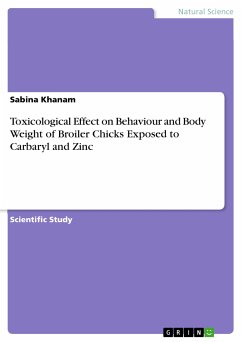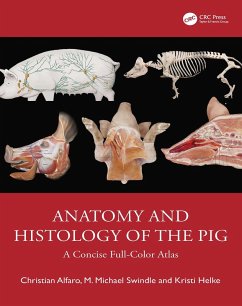
Toxicological Effect on Behaviour and Body Weight of Broiler Chicks Exposed to Carbaryl and Zinc (eBook, PDF)
Sofort per Download lieferbar
Statt: 27,95 €**
18,99 €
inkl. MwSt. und vom Verlag festgesetzt.
**Preis der gedruckten Ausgabe (Broschiertes Buch)
Alle Infos zum eBook verschenkenWeitere Ausgaben:

PAYBACK Punkte
0 °P sammeln!
Scientific Study from the year 2017 in the subject Biology - Zoology, grade: A, , language: English, abstract: This study was conducted to examine the effect of Carbaryl and Zinc on body weight and behaviour of broiler chicks. It deals with pesticides and heavy metals which are of great impotance for pest control in agriculture, various diseases in poultry and for growth in poultry simultaneously. Carbaryl, a carbamate insecticide, is used in poultry industry for destroying and preventing the pest and vectors for various animal diseases. Carbaryl inhibits the acetylcholinesterase (AChE) activi...
Scientific Study from the year 2017 in the subject Biology - Zoology, grade: A, , language: English, abstract: This study was conducted to examine the effect of Carbaryl and Zinc on body weight and behaviour of broiler chicks. It deals with pesticides and heavy metals which are of great impotance for pest control in agriculture, various diseases in poultry and for growth in poultry simultaneously. Carbaryl, a carbamate insecticide, is used in poultry industry for destroying and preventing the pest and vectors for various animal diseases. Carbaryl inhibits the acetylcholinesterase (AChE) activity in vertebrates, insects and human beings while zinc is used in poultry industry for their growth and for normal functioning of different biochemical process in the body. If pesticide enter in the body in excess i.e., above the lethal dose than it can change the function of hormones, neurotransmitters, physiology, morphology and behaviour. Statistically insignificant (p>0.005) increase in the body weight were found in the experimental animals as compared to control was recorded with different doses of carbaryl. While in zinc treated chickens statistically insignificant p>0.005 increases in the body weight of the experimental animals were found as compared to control were recorded with different doses of zinc. Behavioural impacts were examined by looking at changes in activity patterns. Leg weakness ,frequent defecation, less food consumption and dizziness in broiler chicks were found given high dose of carbaryl after one week but the birds fed zinc showed an increase in behavior with increasing concentration up to a certain point, nervousness, leg weakness, and fluffed feathers were found in intermediate and high dose groups. On the other hand, relaxed, happy broiler chicks will vocalize frequently, eat hungrily, preen normally in control group.
Dieser Download kann aus rechtlichen Gründen nur mit Rechnungsadresse in A, B, BG, CY, CZ, D, DK, EW, E, FIN, F, GR, HR, H, IRL, I, LT, L, LR, M, NL, PL, P, R, S, SLO, SK ausgeliefert werden.













